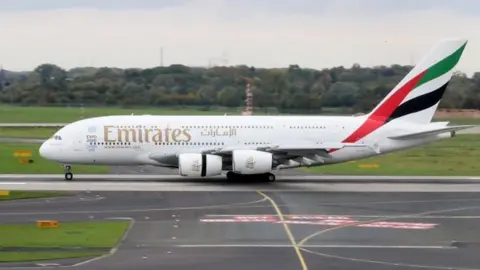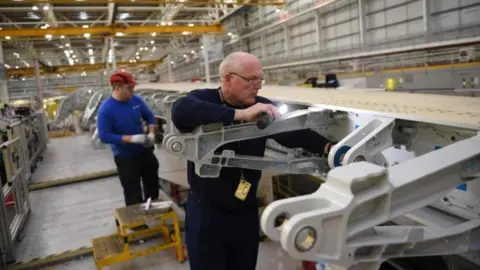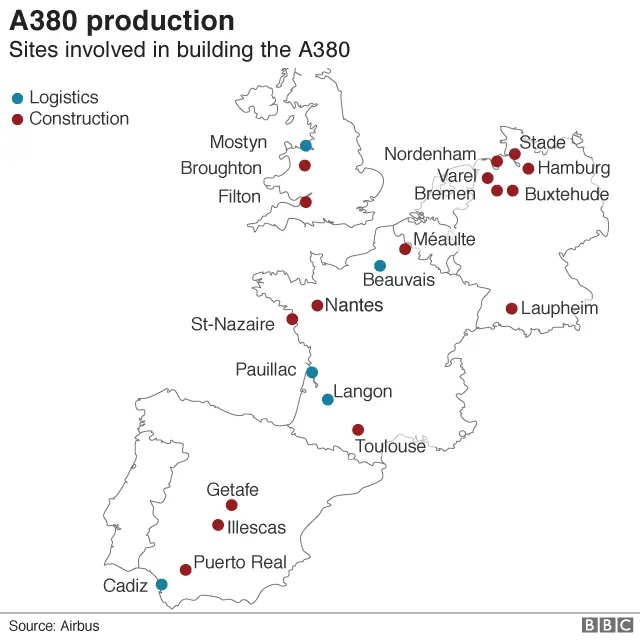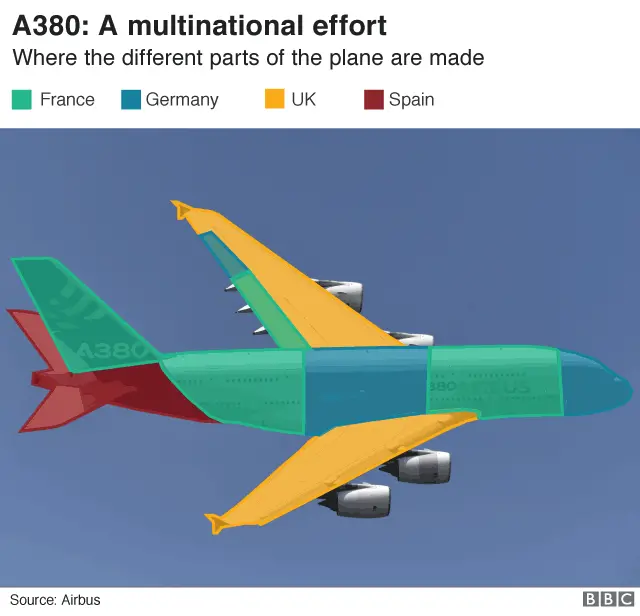Airbus scraps A380 superjumbo jet as sales slump
 EPA
EPAEuropean aircraft manufacturer Airbus has pulled the plug on its struggling A380 superjumbo, which entered service just 12 years ago.
Airbus said last deliveries of the world's largest passenger aircraft, which cost about $25bn (£19.4bn) to develop, would be made in 2021.
The decision comes after Emirates, the largest A380 customer, cut its order.
The A380 faced fierce competition from smaller, more efficient aircraft and has never made a profit.
What has prompted Airbus' decision?
The A380's future had been in doubt for several years as orders dwindled. But in a statement on Thursday, Airbus said the "painful" decision to end production was made after Emirates reduced its latest order. The Dubai-based airline is cutting its overall A380 fleet size from 162 to 123.
Emirates said it would take delivery of 14 further A380s over the next two years, but has also ordered 70 of Airbus' smaller A330 and A350 models.
"Emirates has been a staunch supporter of the A380 since its very inception," said the airlines' chairman Sheikh Ahmed bin Saeed al-Maktoum. "While we are disappointed to have to give up our order, and sad that the programme could not be sustained, we accept that this is the reality of the situation," he added.
The order cut meant keeping production going was not viable, said Airbus chief executive Tom Enders, who is due to step down in April.
There was "no basis to sustain production, despite all our sales efforts with other airlines in recent years" he said.
Airbus has taken a €463m charge for shutdown costs, but it is expected that the repayment of government loans could be waived to help cushion the blow.
The aerospace giant said the financial impact of the decision was "largely embedded" in the firm's 2018 results, which showed a net profit for 2018 of €3bn (£2.6bn) up nearly 30% from the previous year.
Airbus said it would deliver between 880 and 890 new commercial aircraft this year.
 AFP
AFPWhat does it mean for jobs?
Airbus said it would start discussions with partners regarding the "3,000 to 3,500 positions potentially impacted over the next three years".
The BBC understands that around 200 jobs in the UK could be under threat from the decision.
Airbus confirmed it hopes to redeploy a "significant" number of affected staff to other projects.

Mr Enders said: "It needs to be evaluated. It's clear we make a lot of wings in Britain and a few wings for the A380.
"Hopefully we can redeploy a significant number of our employees there and re-use also the infrastructure."
Airbus UK makes the wings for its wide variety of aircraft in the UK. The company employs about 6,000 staff at its main wings factory at Broughton in Flintshire, as well as 3,000 at Filton, near Bristol, where wings are designed and supported.
Parts of the A380 are manufactured in France, Germany, Spain, and the UK, with final assembly and finishing split between Toulouse and Hamburg.
Airbus had already cut staffing as A380 orders dried up, and the future of employment at the company very much now depends on the success of its new generation of aircraft.
Unite, the largest union representing aerospace workers in the UK and Ireland, said it was "bitterly disappointed" by the news, adding it would seek "urgent assurances" from Airbus that there would be no job losses because of the decision.
"We are of the firm belief that with a full order book in single aisle planes, such as the A320, that our members affected can be redeployed on to other work in Airbus," said Rhys McCarthy, Unite's national officer for aerospace.
Why has demand for the A380 fallen?
The spacious jet, which had its first commercial flight in 2007 with Singapore Airlines, was popular with passengers but it was complicated and expensive to build, in part thanks to the way production was spread across various locations.

But ultimately demand for the A380 from airlines dried up as the industry shifted away from larger planes in favour of smaller, wide-body jets.
When Airbus was conceiving the A380, Boeing was also considering plans for a superjumbo. But the US company decided to scrap the idea in favour of its smaller, efficient - and more successful - 787 Dreamliner.
"The very clear trend in the market is to operate long-haul aircraft with two engines [such as] Boeing's 787 and 777, and Airbus's A330 and A350," said Greg Waldron, Asia managing editor of Flight Global.
Airbus had been working on a revamped A380 to make it more efficient, but needed sufficient launch orders to make the huge investment viable.
Despite Airbus' website describing the Airbus as the "future of long-distance travel" the last aircraft will be delivered in 2021.

Where did Airbus go wrong?
Analysis: By Dominic O'Connell, Today programme business presenter
When Airbus's A380 first took off it was hailed as a technological marvel that would meet airlines' needs for a new large aircraft to connect the world's crowded airport hubs - London, New York, Dubai, Tokyo. Airbus said the market for the giant planes would be 1,500.
After today's decision to end production, it will have made just over 250.
In hindsight, airlines were already turning their back on very large aircraft when the A380 made its debut.
Advances in engine technology meant planes no longer needed four engines to fly long distances - and carriers were able to use a new generation of light, fuel-efficient, twin-engined aircraft to link secondary cities, bypassing the crowded hubs altogether.
Even though Airbus was aware of the threat posed by these new types of plane, they pressed ahead.
There was a bigger game afoot - Airbus needed to negate Boeing's 747, believing that the profits the American company made on 747 sales were helping it cross-subsidise other, smaller planes. The A380 succeeded in that - the last passenger 747 was built two years ago - but Boeing will have a kind of last laugh.
Freighter versions of the 747 will be built past 2021, meaning the venerable jumbo jet will outlive the plane sent to kill it.

